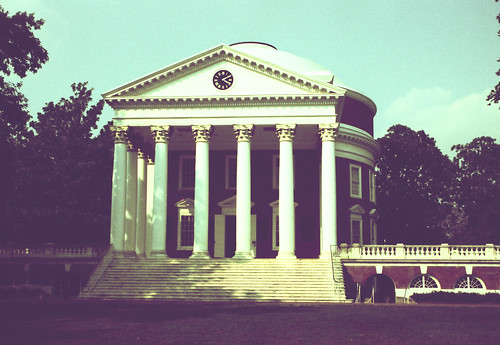I'd almost forgotten I had this blog. For whatever reason, my web browser stopped working with Blogger for a while, and I left it behind. My thanks to
Bill Emory for helping me remember its existence.
I am currently working with
Charlottesville Tomorrow as an intern and
Advocates for a Sustainable Albemarle Population as a web developer. I'm expecting good things of both in the future.
Much as I enjoyed working in the wine department at Foods of All Nations for a year and a half, I must say that working in my area of interest has made me feel alive again. Exciting things are happening. You can see what I'm working on with Charlottesville Tomorrow on the
weblog. It's exciting stuff.
Also, the ideas I discussed in my previous posts remain near and dear to me, and I will get to them. However, at the moment I'm focusing on getting my wine distributing company off the ground and my self into graduate school. Much as I've enjoyed interning with Okerlund Associates, Topia Design, Oliver Kuttner, and Charlottesville Tomorrow, I'm anxious to be able to work on my own two feet, and a Masters in Urban Planning is necessary for that.




3 comments:
lyle- history is enchanted with rich people. the neighborhood you live in now, the woolen mills, is crawling with history, but its inhabitants worked with their hands.
Other locales have had the vision to preserve this sort of cultural landscape.
The historic woolen mills would be a great counterpoint to the Elite Architect Writer Guy that lived on the mountain and didn't talk to his family during dinner.
Recognizing the historic character of the mill neighborhood could serve as a mitigation project, as belated penance by the city for its "urban-renewal" of Vinegar Hill.
I think the city cries crocodile tears about Vinegar Hill. The city strives to gentrify history. The woolen mill community was a bunch of poor white-folk. Let it follow Vinegar Hill onto the ash-heap.
I agree with the idea of engaging Woolen Mills history as a way of reclaiming that lost working class history. Sort of a Frontier Museum, but early industrial/agricultural. I could see a rehabilitated Mills as part of that. That would actually be an amazing thing. Because I really feel like we need to reclaim that industrial flavor, but it's an early industrial flavor. As you say, working with hands. I'd be fascinated to see what possibilities there are. Maybe get some synergy with Civil War history folks, since we're such a significant chapter of that story. There's a lot of possibilities there.
The trick, of course, would be to figure out how to regain that historic aliveness, without losing the modern relevance of the site. Woolen Mills doesn't need to be a museum. Juicy stuff.
Whoah, I've got something. Work with City landscaping to shift from big lawn mowing equipment to a municipal shepherd with a flock of sheep. I guarantee someone would love that job, whatever it paid. Curitiba, Brazil does this successfully. This keeps the parks well-kept, in a much more charming and pleasant way, and also produces wool. What do we do with the wool? Use it in the restored historic Woolen Mills of course! The mill would make textiles, and tourists could buy them. It's a shame I'm not a multimillionaire, or I'd bankroll it right now. But I bet people would love something like this.
Post a Comment